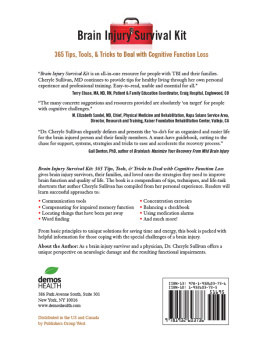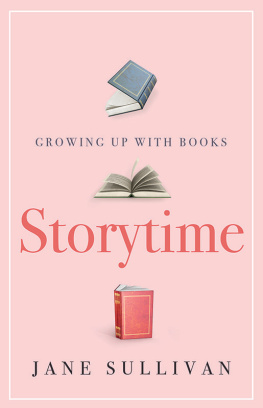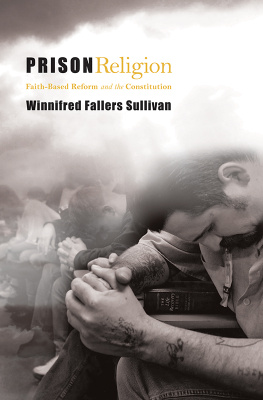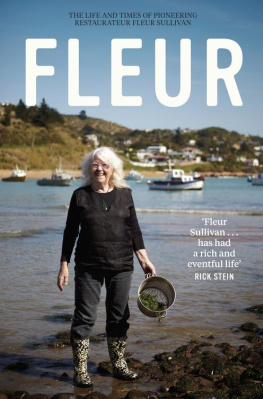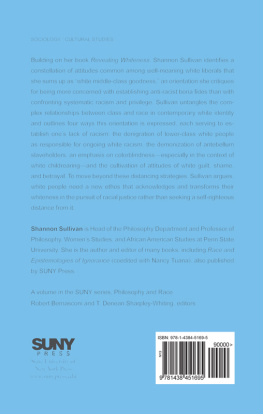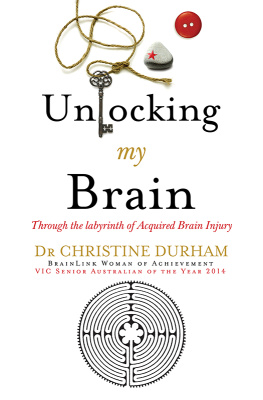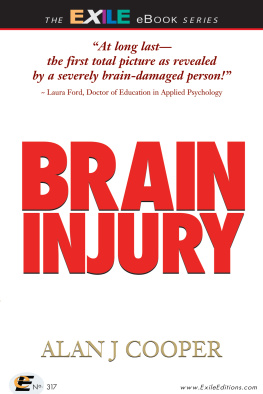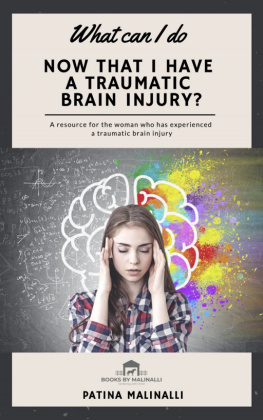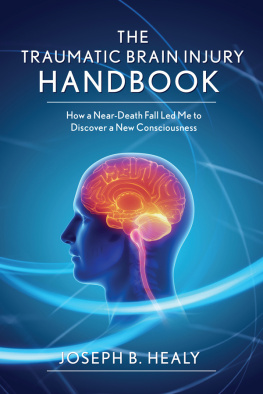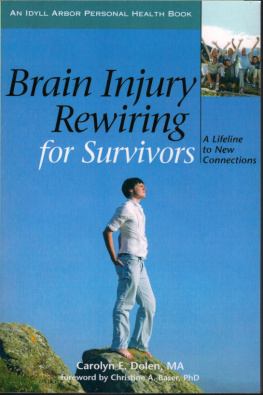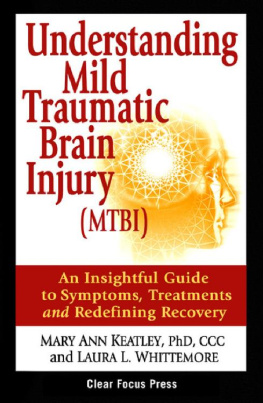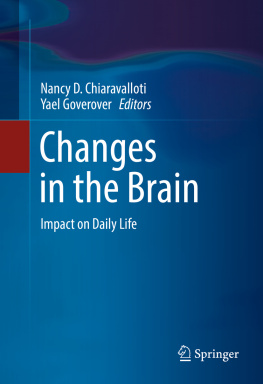

Brain Injury Survival Kit
365 Tips, Tools, & Tricks to Deal with Cognitive Function Loss
Cheryle Sullivan, MD

Visit our web site at www.demosmedpub.com
2008 Demos Medical Publishing, LLC. All rights reserved. This book is protected by copyright. No part of it may be reproduced, stored in a retrieval system, or transmitted in any form or by any means, electronic, mechanical, photocopying, recording, or otherwise, without the prior written permission of the publisher.
Medical information provided by Demos Health, in the absence of a visit with a healthcare professional, must be considered as an educational service only. This book is not designed to replace a physician's independent judgment about the appropriateness or risks of a procedure or therapy for a given patient. Our purpose is to provide you with information that will help you make your own health-care decisions.
The information and opinions provided here are believed to be accurate and sound, based on the best judgment available to the authors, editors, and publisher, but readers who fail to consult appropriate health authorities assume the risk of any injuries. The publisher is not responsible for errors or omissions. The editors and publisher welcome any reader to report to the publisher any discrepancies or inaccuracies noticed.
Special discounts on bulk quantities of Demos Medical Publishing books are available to corporations, professional associations, pharmaceutical companies, health care organizations, and other qualifying groups. For details, please contact:
Special Sales Department
Demos Medical Publishing
386 Park Avenue South, Suite 301
New York, NY 10016
Phone: 800-532-8663 or 212-683-0072
Fax: 212-683-0118
E-mail:
Library of Congress Cataloging-in-Publication Data
Sullivan, Cheryle.
Brain injury survival kit : 365 tips, tools & tricks to deals with cognitive function loss / Cheryle Sullivan.
p. cm.
Includes index.
ISBN-13: 978-1-932603-73-6 (pbk. : alk. paper)
ISBN-10: 1-932603-73-5 (pbk. : alk. paper) 1. Brain damage-Popular works. I. Title.
RC387.5.S85 2009
617.4'81044-dc22
2008017420
08 09 10 11 5 4 3 2 1
Success is best measured by how far you've come with the talents you've been given.
Anonymous
This book is dedicated to my mother, Mary Lou Sullivan. Her legacy is the fact that she raised six children to be upstanding, contributing members of their communities. She worked hard, always with pride in what she did, and contributed to the lives of many people. She made a difference with her life. I hope I can say the same when my time comes.
My mom left my life too early, just prior to her retirement, at age 61. She practiced a healthy lifestyle and should have lived a long life. Instead she died on 10/20/97 as the result of a traumatic brain injury, caused by a fall on stairs in her home. She was never able to do all the things she said she'd do someday. Her death, more than my own brain injury, pushes me to try to make a difference for other brain injury survivors, to work to increase awareness of this silent epidemic, to get the word out about the importance of preventing traumatic brain injuries and to advocate within the health care system and the community for persons with disabilities.
Foreword
If you are coping with a brain injury either personally, within your family, or among your friends you have just opened the right book.
The Brain Injury Survival Kit is unique in the world of self-help literature. It isn't written by just another doctor who likes to write, or by a brain injury survivor who likes to share, it is a combination of the two and you are the beneficiary.
Cheryle Sullivan, MD, knows brain injury BI and she knows it intimately. Before her own accidents, she dealt with BI in her immediate family, so the road has been long and hard, but instructive. As a physician, she thinks scientifically, making the kind of connections between neurology and everyday reality that escape most of her peers, and virtually all of ours. She has walked the walk and now she is talking the talk to you.
The Survival Kit is a practical approach to living every day (every single day, since it provides 365 tips, tools and tricks) with a brain injury. The severity of the impairment will, of course, dictate the utility of what you learn, but there is clearly something for everybody in this great collection of helpful hints.
Those of us in the field of education, prevention, and treatment understand that, historically, brain injury has been a hidden epidemic, plaguing the world for centuries, without its due notice. Unless a head injury resulted in obvious surgery, facial alteration, or physical impairment, most brain dysfunctions were invisible to others. Injuries resulting from falls at home or collisions on the football field had been dismissed as mere concussions, where the survivor was merely knocked out.
No more. Between America's professional sports and the mid-East wars of the new century, awareness has risen. People are beginning to wear helmets when skiing, riding bicycles or playing on skateboards. Schools and teams are collecting baseline data for annual comparisons to monitor the status of basic brain functions. Emergency rooms are doing follow-ups on the most minor of head injuries. Intensive Care Units and Rehab centers are saving lives and brain function with new drugs, machines, and techniques.
Knowing about all of this progress, Dr. Sullivan has stepped forward to serve the cause. I frst met her at a Brain Injury 101 class that she was teaching in Colorado Springs, at Penrose Hospital, where I served as Director of Rehabilitation Services. I was (and am) President of the Board of Directors of the Brain Injury Association of Colorado (BIAC), whose mission is to enhance the quality of life for survivors of brain injury and their families, and BI 101 is one of our community classes.
Beyond her vast knowledge of the neurological basics of BI, I was struck by Dr. Sullivan's common-sense approach to daily life, and, of course, her vibrant sense of humor. She was amazingly direct and transparent about her own impairments, often laughing at herself when a word escaped immediate recall; she would calmly capture the moment and use it as an example of impaired brain function. Such spontaneous honesty made her more human and approachable to the audience many of whom were also survivors.
Increased awareness and advanced technology have created the greatest population of known brain injury survivors in the history of the world, so Dr. Sullivan's book is a timely and valuable contribution. If you are living with or near brain injury you will immediately recognize the physical, mental and emotional challenges cited in this book, and you will appreciate the experience-based solutions offered. I am proud to recommend it.
Gary A. Morse, MA, MS
Vice President, Human Resources,
Penrose-St. Francis Health Services,
Colorado Springs, CO
Preface
It is hard for me to believe that it has been 10 years since my mom's death from a Traumatic Brain Injury (TBI) and 5 years since the TBI that changed the course of my own life.
Next page
